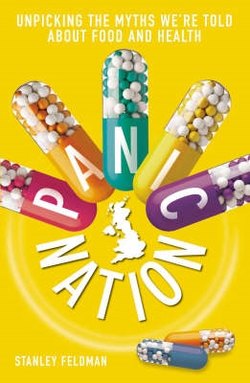Читать книгу Panic Nation - Stanley Feldman - Страница 29
На сайте Литреса книга снята с продажи.
Lowering Cholesterol Levels With Drugs
ОглавлениеSurely, despite everything written up to this point, all previous arguments are refuted by the knowledge that lowering cholesterol levels with statins protects against heart disease. As all good scientists know, ‘reversibility of effect’ provides the most powerful supportive evidence for a hypothesis.
However, the flipside to this argument is as follows. How can lowering cholesterol levels prevent heart disease in people who do not have a high level? The most often-quoted clinical trial in the last few years is the UK-based Heart Protection Study (HPS). A veritable triumph for statins, demonstrating protection in almost every group studied.
What is most intriguing, however, is that protection was apparent if the starting cholesterol level was high, average or low. How can this be explained? At this point we enter Alice in Wonderland territory. A rational person would accept that a normal cholesterol level cannot be a risk factor for heart disease (or anything else for that matter). Therefore, people with normal cholesterol levels can gain no benefit from having their levels lowered.
So, if statins do protect those with normal, or low, cholesterol levels – which they clearly do – they must be doing this through some other mechanism of action, unrelated to cholesterol lowering. In fact, there is a growing body of evidence to support the idea that statins have a whole series of different protective actions.
However, accepting that statins work ‘in another way’ would demolish the final buttress keeping the cholesterol hypothesis afloat. And so the latest argument is that no one in modern society has a normal cholesterol level. An article in the Journal of the American College of Cardiology best sums up this line of thinking. Under the heading, ‘WHY AVERAGE IS NOT NORMAL’, O’Keefe, the lead author, makes the claim, ‘Atherosclerosis is endemic in our population, in part because the average LDL [low-density lipoprotein, or ‘bad’ cholesterol, of which more later] level is approximately twice the normal physiologic level.’ In short, according to O’Keefe, our cholesterol level should be about 2.5 mmol/l, not 5.2 mmol/l.
This argument, if true, does neatly demolish the question, ‘How can people with normal, or low, cholesterol levels be protected against heart disease?’ O’Keefe and others would argue that we all have a high cholesterol level. Everyone is ill, and all shall have statins.
One oft-quoted fact that seems superficially supportive of O’Keefe’s hypothesis is that peasant farmers in China have very low cholesterol levels and a very low rate of heart disease (although their average cholesterol levels are actually about 4, not 2.5).
But, when you study the figures with more care, they reveal something else. As usual, those with low cholesterol levels have by far the highest mortality rates. Liver failure and liver cancer are common causes of death. However, there is a simple explanation for this association.
Many Chinese peasant farmers have chronic hepatitis, which creates low cholesterol levels, and also leads to liver failure and liver cancer, which is why people with low cholesterol levels die young.
Does this mean that a low cholesterol level protects against heart disease? No. What the Chinese data tell us is that those with higher cholesterol levels are not chronic-hepatitis carriers, so they live longer and have more chance of developing heart disease in old age. On the other hand, those with low cholesterol levels cannot die of heart disease, because they are already dead.
Without chasing too many mad arguments around, the simple fact is that everyone in the West does not have a raised cholesterol level. Repeated studies have shown that a perfectly normal or healthy cholesterol level lies between about 4 and 6, and lowering it cannot protect against heart disease, otherwise we will have introduced a new concept into medical science. Normal is unhealthy and must be treated.
People are grasping at straws in their attempt to explain why statins protect against heart disease in those with normal cholesterol levels, and in women and the elderly, where a raised cholesterol level is not even a risk factor. The only possible explanation for the results of the statin trials is that statins do not work by lowering cholesterol levels.
